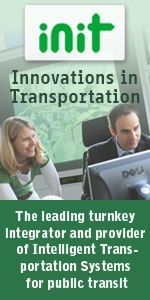

| In This Issue |
| » NEWS HEADLINES |
| » COVERAGE OF 2010 LEGISLATIVE CONFERENCE |
| » COMMENTARY |
| » TELLING OUR STORY |
| » APTA NEWS |

Check out the classifieds for job opportunities including a general manager, a director of paratransit, and a regional president with a management firm!
| NEWS HEADLINES |
DOT Secretary Lauds ARRA, Transit Industry; Acknowledges Challenges Still Ahead
BY SUSAN BERLIN, Senior Editor
In his remarks at the March 15 Opening General Session of the APTA Legislative Conference, Secretary of Transportation  Ray LaHood spoke proudly of the funding support provided to public transportation through the American Recovery and Reinvestment Act (ARRA) in its first year, but in response to hard-hitting questions from the audience, he acknowledged that many funding challenges remain for the industry.
Ray LaHood spoke proudly of the funding support provided to public transportation through the American Recovery and Reinvestment Act (ARRA) in its first year, but in response to hard-hitting questions from the audience, he acknowledged that many funding challenges remain for the industry.
He told a packed room: “What a difference a year makes! A year ago, we were heading into a recession, but—with the help of the American Recovery and Reinvestment Act—we’ve lived up to our commitments. In the last quarter of 2009, we provided 41,000 direct jobs through ARRA.” He added: “Thank you for helping us move so far, so fast.”
Of the $8 billion that went to public transit, all funds assigned to the Federal Transit Administration (FTA) have been allocated, and “look at what we’ve been able to do with that funding,” he said. For example, he cited Link Transit in Wenatchee, WA, which is using its $3 million grant to replace five diesel-powered circulator buses with zero-emission vehicles powered by lithium-ion batteries and to build a “quick charge” automated opportunity charge station.
But ARRA was only the beginning, LaHood emphasized. He said DOT is crafting a program that will provide almost $1 billion in additional discretionary funds for public transit projects, with the funds to be distributed before the end of 2010.
LaHood said DOT is working to “strike a new balance to maximize the effectiveness of each mode.” He pointed to the Transportation Investment Generating Economic Recovery (TIGER) program, which enables transit agencies to compete for funds directly rather than working through a governmental agency. LaHood noted the “remarkable transformation taking place” with the introduction of new transit services, such as light rail in Phoenix and a project in Kansas City, MO, that will incorporate streetscaping, bicycle and pedestrian routes, and public transportation.
Regarding a new surface transportation authorization bill, he said streetcars and other livability measures “are going to be a big part” of the proposal sent to Congress. He continued: “I had a meeting with the president recently and we talked about the authorization…We need your help on this, to be creative about funding.”
The secretary also mentioned such safety initiatives as eliminating distracted driving, which included transit operators (“We want to require professional drivers to share the road responsibly”), mandated positive train control, and a proposed $30 million for a new rail safety program within FTA.
‘We Have a Lousy Economy’
After his remarks, LaHood invited questions from the audience, and responded candidly to them.
Several APTA members talked frankly about how they must raise fares, reduce service, and lay off staff because their revenues have fallen and they are prohibited from using federal funds for operating costs. While noting that ARRA funds allowed 10 percent to be used operationally, he said that he is open to legislation that would allow more federal transit funds—traditionally restricted to capital uses for most transit systems—to be available for operating assistance.
He said there was a need for a “sliding scale of opportunity depending on how the economy is,” with more operating funds made available when it is down.
When asked about the likelihood of passage of a multi-year authorization bill, LaHood replied that “it’s on the radar.”
“We have a lousy economy,” he reiterated, adding that while President Barack Obama “believes in the need for an authorization bill,” with the bad economy, the president did not want to raise the gasoline tax at this time. “We just have to find a way forward,” he said. “It’s a priority for the president.”
More of LaHood's comments on the challenges facing public transportation agencies in the current economy, and the possibility of using federal transit funds for operating expenses, can be found on his blog.
Other Speakers
In his remarks at the opening session, APTA President William Millar quoted a Congressional Budget Office study showing that ARRA saved and created 2.1 million jobs in its first year, and that “transit was among the most efficient parts.” He also said APTA is calling on Congress to set the authorization limit for public transportation at $123 billion over six years, along with $50 billion annually for high-speed rail.
“We want federal safety legislation and standards to build on what we’ve already done,” Millar said of the effort referenced by LaHood, adding that surface transportation has long been the safest mode of travel.
APTA Chair M.P. Carter emphasized that transit professionals should “tell their story” to their members of Congress during the conference and “make the case for increased investment in public transportation.” She noted the challenges of a difficult economy—resulting in service cuts, fare increases, and staff layoffs for many transit agencies—but said: “I see these challenges as an opportunity to make our industry even stronger.” Carter also announced that the APTA Board of Directors had approved the strategic plan covering 2010-2014, and amended the bylaws to incorporate a new governance structure.
| Return to Top | Return to Main | Next Article » |
|
||||||
| AMERICAN PUBLIC TRANSPORTATION ASSOCIATION |
Telephone (202) 496-4800 • Fax (202) 496-4321
Search Back Issues
